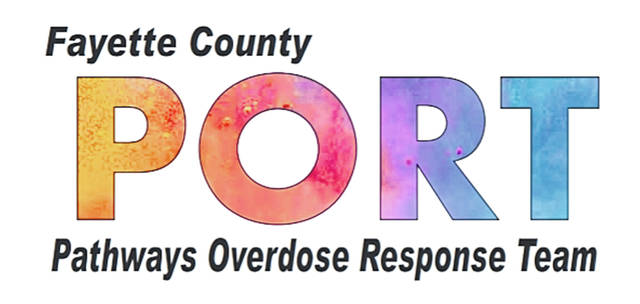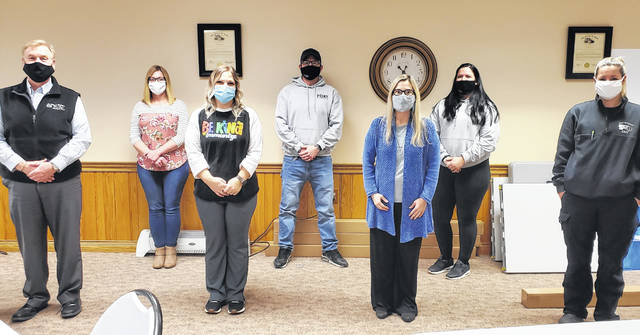

The local Pathways Overdose Response Team (PORT), also called the Quick Response Team (QRT), has been keeping busy during the pandemic as the number of drug overdoses has risen. PORT is just one component of Fayette County Pathways to Recovery.
Fayette County Pathways to Recovery was started early 2019 through the Community Action Commission and consists of five certified Peer Recovery specialists who have a lived experience of addiction and have found long-term recovery. As previously reported, the program was based upon the philosophy that there are multiple pathways to recovery, people can and do recover, and that peer support and care coordination are essential to preventing the senseless number of lives communities have lost in the past few years. Pathways to Recovery is funded via a federal grant.
The focus of PORT, according to coordinator Joe Cantrell, “was and still is to get more community involvement.” PORT includes representatives from multiple local agencies to assist with this focus.
Those representatives include probation officer Brian Carlson representing the Washington Municipal Court, EMS paramedics Hannah Dingman and Tony Kegg representing the Fayette County Memorial Hospital Community Paramedic Program, site supervisor Kyndle Clark representing Fayette Recovery Center, nurse Ashley Roberts (RN) representing Fayette County Public Health, substance abuse counselor Mark Allen representing Sciota Paint Valley Mental Health, outreach coordinator Christopher Skelly representing Ohio Addiction Recovery Center, and coordinator Joe Cantrell and admin assistant Jessica Pfeifer representing Pathways to Recovery.
Under the umbrella of Pathways to Recovery, members of PORT go into the community to make contact with those who recently overdosed.
Dingman said, “After an overdose, those are the most critical times of someone’s life. A lot of them realize, ‘I just overdosed, I almost died.’ Then we’re showing up typically within a couple of days knocking on the door saying, ‘Hi, we care about you. Here are some resources.’ To some people that’s the difference between life and death.”
Although referrals tend to come from overdose data from local law enforcement, referrals can also be made via hospital staff, family, friends or the very individuals who overdosed and want assistance. According to Cantrell, often times they end up knocking at doors and either getting no response or talking to a family member who is home.
Cantrell said, “If we go out to 10 different houses and we get that one house where the person’s weary about opening the door, then we try to explain who we are, why we’re there… then from there on, we could change their life. We’ve had it happen. We’ve had instances where people were like, ‘this is exactly what I’ve been waiting on.’”
Pfeifer is currently attending Southern State Community College. She is an intern for Pathways to Recovery.
“When I first started here, Joe (Cantrell) told me a little about the Quick Response Team. I had more of a personal interest because, from my hometown (Chillicothe), I was pretty regular with QRT. So, I received in my addiction numerous visits from that Quick Response team,” said Pfeifer.
Pfeifer further explained, “for me, how it worked is the seed was planted. I was given resources that day. Granted, I didn’t use them that day. It was probably a year or two later when I was continuing to use when I finally reached the point of being done. I was like, ‘Oh, that guy gave me treatment resources.’ That’s what I referred to when I was ready to make that step. I think sometimes that’s overlooked. People don’t see it as a sign of progress just because I didn’t take the help that day, but later on I was able to refer back to the resources that were given, and I’ve been able to maintain sobriety ever since with those resources, with getting into treatment, and taking all the steps with the help that they had given me. QRT is definitely more of an interest and passion for me, because I do know how that initial, first encounter can be and later on when they do wake up.”
Every trip that PORT makes, they try to have at least one peer support specialist from Pathways join them. Brooke Truman became a peer support specialist for Pathways in June of 2019. Truman explained her role during PORT visits:
“Once I start talking about my past during active use — the things that I did, the consequences I had, and the path that I took, then I can start to feel and see the connection. I try to just listen at first, but I definitely want to let the person know I’ve been through a lot of what they are going through. I think the relatability and connection is the most important thing,” said Truman.
Education is provided to all involved as representatives explained it is important for family and friends to take care of themselves and their own mental health.
Truman explained she recently told a peer’s spouse that it is important to determine one’s own boundaries and mental health needs. Family members, whether they be a spouse, child, close friend, parent, etc. are watching a loved one kill themselves slowly.
“Where do (they) draw a line?” asked Truman. “Family members are just as affected. They just don’t use the drugs to cope with what’s going on.”
As PORT has representatives from multiple agencies, individuals the team reaches out to have multiple options for treatment access and support systems.
By becoming a peer of Pathways to Recovery, individuals then have access to case management, care coordination, transportation for treatment, education for friends and family, etc. The program helps make connections for individualized needs to “help stabilize their lives,” according to Cantrell.
Carlson explained that individuals who are looking for assistance can come to the Municipal Court to request it. He said there was recently an individual who came to the court looking for help and that individual was referred to him as he was present and had a direct link to Pathways through PORT.
Dingman explained that she often talks about PORT and substance abuse awareness with individuals she comes in contact with through her EMS employment, including law enforcement, healthcare workers and individuals who could benefit from the assistance.
Roberts explained FCPH offers a Vivitrol program which is one of many ways that can help people battling an opioid or alcohol addiction. Vivitrol is a Medicated-Assisted Treatment (MAT). Part of the program is having a nurse practitioner on-site to see individuals.
Clark explained that Fayette Recovery Center is a treatment facility that offers various options.
“Being and working with the (Quick Response Team), it’s a sense of we’re all holding each others’ hands. We all have our different specialties, but we’re able to go out there together and just let somebody know that they are important and that we can help them,” said Clark. “When we got out, it’s person-centered. A lot of times when I’ve gone out with the team, we’ve done a lot of work with the parents and the kids and gave them education. They might be feeling a lot of different negative emotions. Maybe guilt, shame, hurt, anger. Just seeing somebody that they don’t know and knowing that they’re not alone is helpful to try to bridge that need to bring somebody in and help save their life and help them work on their recovery.”
Dingman said, “just because you are an addict doesn’t mean people don’t care about you. We need to break the stigma so we can all move forward toward recovery together. This is not an individual battle, this is a community battle.”
“This is going on, people are dying in our community,” said Cantrell. “It’s going to take the community to make a change.”
PORT is just one access point into recovery for individuals but not the only access point. There are multiple factors and considerations that go into addiction and recovery. Follow the Record-Herald for future articles going into detail on different options, programs, the above mentioned representatives and local supporting entities.
Those who are or know someone who is struggling with substance use, contact Pathways to Recovery at 740-335-7282 or reach out via the Hope Line at 740-463-1009. Pathways to Recovery is located at the Community Action Commission of Fayette County, 1400 N.W. US 22, Washington Court House.
Reach journalist Jennifer Woods at 740-313-0355.



